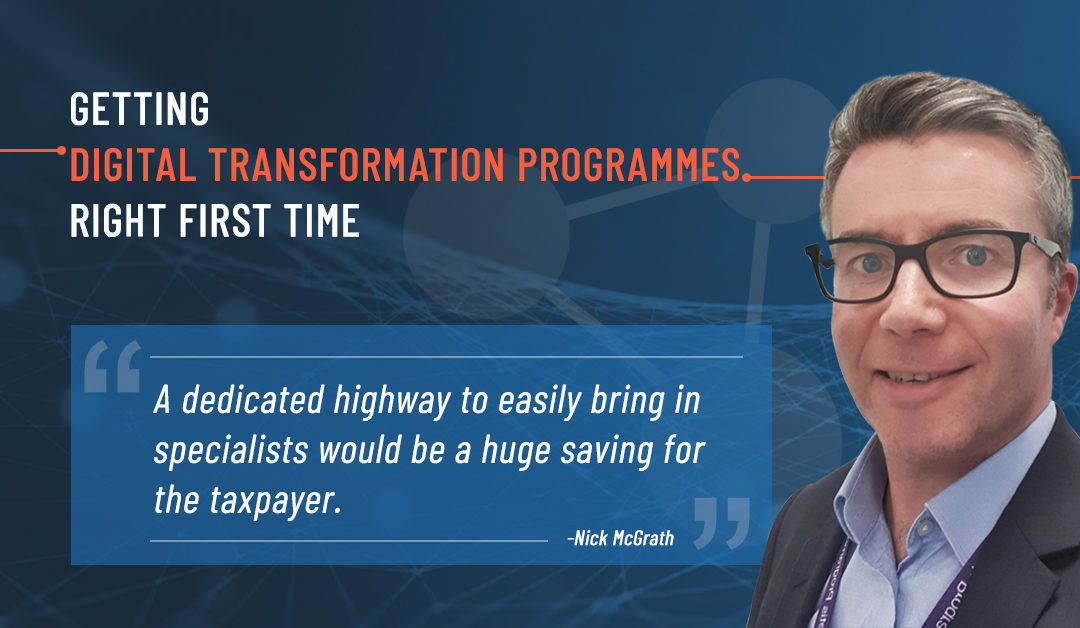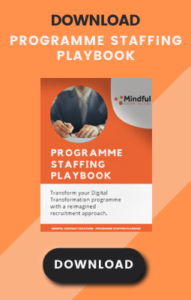In part 3, which focuses on the execution of your Digital Transformation Programme, Nick explains that a dedicated highway to easily bring in specialists would be a huge saving for the taxpayer.
Previously, we have explored: Building the right strategy for your Digital Transformation Programme and Planning for your Digital Transformation Programme.
Mindful: We tend to hear about the role SIs play in Digital Transformation. However, not much is said about the role of client-side teams. How important you have found the client-side team to be in your experience as a leader of Major Government Programmes, and how vital that is to programme success?
Nick: I think it’s fundamental. System integrators are often able to operate effectively because they share knowledge within their organisations really well. They’re able to deliver big, complex projects more easily because they do it often. And they’re not having to figure out what approach to take and what methodology to take every time. The consultants’ incentives are focused on sharing knowledge and developing methodologies, and then applying those to each customer’s situation in a way that is much more efficient than the customer trying to do it themselves.
However, what it sometimes means is that their motivation is not to deliver the benefits that you are looking to get. Instead, their motivation can understandably be to hit milestones, then charge their people to another client. So even though they are behaving in an entirely honest and appropriate way, their motivation may not be the same as yours. I’m not criticising them, but the nature of their business is such that you’ve got to be able to keep checking all the time that all the decisions they’re making, and the way that they’re working, is focused on your outcomes and your benefits, and not just theirs.
Mindful: The one thing we’ve observed from a client’s perspective is that the SI’s have competing priorities. Unlike that, the client-side team is a part of “your” team, because they are aligned to your purpose from nine to five.
Nick: That’s right, it’s like good contractors are literally on the client’s side. I do think it’s really important to say that this is not a criticism in any way of SIs. I think it’s just fundamentally the nature of their business and that’s what they’re focus is on. The way the marketplace works, the more efficient and effective they are at reusing knowledge and applying it elsewhere or on a further engagement with you, the quicker they can meet their targets. You need people to balance this, who are able to understand what the SI is doing, and to keep course-correcting and checking that it is about your outcomes.
Mindful: Can you broadly describe the considerations you use to define a target operating model? And do you believe that a core-periphery model (core: civil servants, periphery: contractors) is the kind of model you would want for your client-side team?
Nick: I think it has to be a blended approach. There’s no other way of doing it. If a government department is going to be able to exploit and get the best out of digital technology, then we’re going to have to develop new capabilities that we’ve never had to have before. IT enables different ways of working, for example, having all your data available so that you can analyse and interpret it in order to make better decisions. Sometimes we’ve never had that data before so we haven’t needed to be good at analysing it and interpreting it. That’s a whole new area.
In corporate services you can think about using that data as a way of managing service levels and identifying bottlenecks and diagnosing where there are problems in a process that are leading to poor service delivery. Again, we’ve never been able to do that before. We don’t have those skills to work in an agile way where you can respond quickly to indicators that you get from the system because it’s digital. As we’ve never done that before, it is really important to be open to bringing outside knowledge and expertise in. It would be hugely inefficient and much more expensive for us not to.
“If a government department is going to be able to exploit and get the best out of digital technology, then we’re going to have to develop new capabilities that we’ve never had to have before.”
Mindful: One of the things we are trying to do at Mindful is preserve the on-demand talent pool. We believe that all of the changes in regulations in respect of IR35 will have the effect of drastically depleting that talent pool. Without this pool, specialists will simply be locked into organisations and not available when you want them.
Nick: No, that’s right. To innovate or deliver technology-enabled programmes without having access to client-side expertise that’s available quickly, one way or another. There is a balance in terms of procurement etc. but this is one of the biggest challenges any Programme Director faces.
Mindful: What we have found in our experience of working in programmes is that a lot of time is spent on staffing your team. Do you support Major Programmes that act as temporary organisations to have a dedicated highway to external talent for programmes?
Nick: Yes. It’s a fact of life that there are processes that can make it difficult for you to get the right resources. That is an enormous distraction from being able to get on with the work. We are not yet managing PPM, or technical specialists as a group of resources who can be scheduled around different parts of one department, or even better, all departments. We’re some way from being able to do that. Even if we could, we would not have all the specialisms and skills, particularly in terms of novel IT, that we would need to operate. So obviously it’s a challenge and there are rules that must be followed. But if there was a way of expediting that then it would save time and be a saving for the taxpayer.
This is the third and final part of our interview with Nick McGrath.
The views and opinions expressed in this blog are those of the authors and do not necessarily reflect the official policy or position of any other agency, organisation, employer or company.



